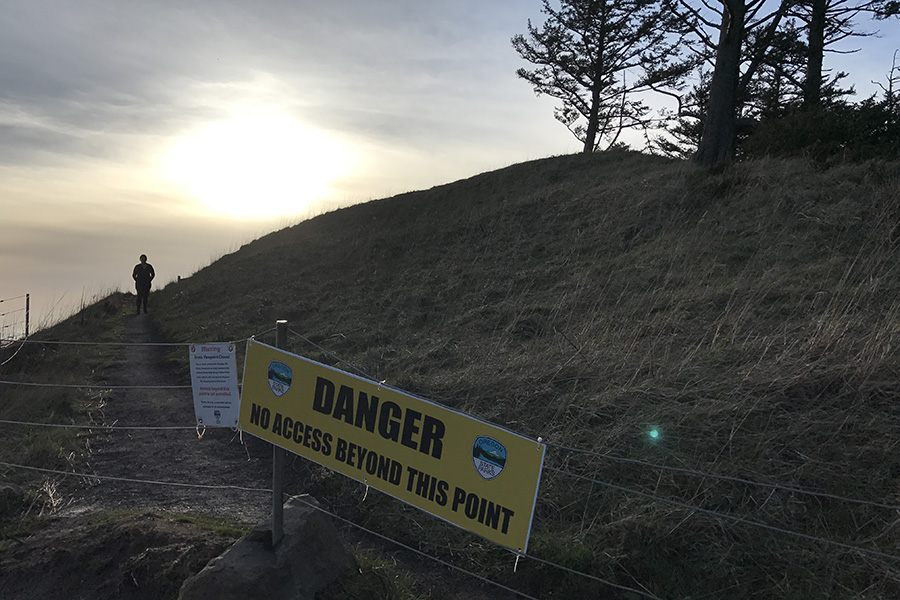
Nursing
Theology
Awards and Rankings
Social Work
December 4, 2017

[Above: student photo from Photovoice project. "I selected this picture because it reminds me of how some people when talking about grieving will want to stop and not go onward to say more, but 'E' in the background went on to get to the brighter side."
Recent studies have indicated a significant decline in empathy, the ability to understand and share the feelings of another, among college students. But when those students are studying fields, such as those in health care and social work, where they will work with clients who are dealing with suffering and loss, the ability to be empathetic is critical.
An award-winning project by three University of Portland faculty explores the question of how to train students to encounter profound pain and suffering, a type of training that has been lacking for students in fields such as nursing, social work, theology, and counseling, where they will be called upon to enter into another person’s grief and anguish.
Dr. Anissa Rogers, professor of social work; Dr. Barbara Braband, associate professor of nursing; and Dr. Rebecca Gaudino, lecturer in theology, were recently recognized with a national award for Innovative Teaching in Social Work Education, given jointly by the Council on Social Work Education (CSWE) and SAGE Publishing, for developing an instructional program which teaches empathy in conjunction with self-reflection.
The three faculty recognized the need for teaching methods that help students better understand human connectedness, an understanding that would require self-reflection and deeper learning, as well as the ability to witness the suffering of others with empathy and professional insight.
“As helping professionals, we often face situations in which we are called to be present with clients who experience loss and grief. However, in training for helping professionals, such as nurses or social workers, we often miss opportunities to experience deep learning about ourselves and others that allow us to integrate emotion, critical thinking, and reflection,” said Dr. Anissa Rogers. “Because of the nature of the work in which social workers and other helping professionals engage, educators need new pedagogical tools and methods that help students engage all of their ways of perceiving to make meaningful connections between clients’ experiences and their own lives. We need opportunities to explore our own and others’ deep emotions to truly experience our connectedness and to respond in effective, authentic ways.”
Dr. Braband initially developed an interview assignment in response to her own suffering with cancer. “The interview project, the foundation of our work, helps students engage at a deeper level with someone they know personally in a non-clinical setting, which helps them connect and empathize with the subject in a safe, natural setting,” she noted. The series of several scripted, open-ended interviews guide students to explore others’ stories of suffering, the holistic impact of the suffering, and how hope and recovery emerge in response to being accompanied during suffering. Students then complete self-reflection questions following each interview session, exploring their own pain and suffering and the ways in which their own experiences impact how they engage with clients.
“Students need safe opportunities to explore the experiences of others’ suffering and grief outside clinical settings in order to learn how to respond to deeper emotional issues in a therapeutic, yet genuine manner,“ added Braband. “Faculty guides them as they learn how and when to enter into another person’s grief and suffering.”
Within courses on suffering, death, and dying, the three faculty adapted the interview and recently implemented Photovoice methodology, a process in which people use video or photo images to capture aspects of their personal experiences, as a teaching tool embedded in the reflection phase of the interview assignment.
As part of the Photovoice process, students were asked to take a series of photos to reflect on their thoughts and feelings related to the interviews. The images immersed the students in the experience and served as another connection to the voice and the pain of their subject than written material. The students continued the self-reflective photographs over the course of three subsequent interviews, so they could see what they learned about themselves, about their subject, and how they were developing the very skills that are needed.
“An important and foundational piece in the project is about the students' own growth as human beings who learn to reflect on their own suffering and their own responses to suffering,” noted Dr. Rebecca Gaudino. “In meeting their own woundedness, they also learn to accompany others who are wounded. This speaks to the deeply spiritual roots of our project.”
The classes have drawn students from a number of disciplines, including those pursuing careers in gerontology, mental health, theology, grief counseling, hospice care, trauma recovery and more.
The project immediately stood out and resonated with the CSWE and SAGE judges in how the faculty had their students go about the projects, developing empathy skills in a way that was very personal.
“We chose that project for the Innovative Teaching in Social Work Education award because it deals with such a sensitive subject in the social work world, which is how skilled someone is when working with a client who may be dealing with grief and loss”, said Joshua Perigo of SAGE Publishing. “Social work is a personal profession, and you can’t develop the proper skills you need as a professional without being personally involved with people. These three instructors are doing a great job of skill development with their students which will prepare them to handle difficult situations when they step out of the classroom.”
University of Portland
5000 N. Willamette Blvd.,
Portland, Oregon 97203-5798
503.943.8000
This website uses cookies to track information for analytics purposes. You can view the full University of Portland privacy policy for more information.
